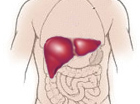
Chronic hepatitis B virus (HBV) infections often cause advanced liver disease (cirrhosis), which then develops into liver cancer. Fortunately, treatment with the antiviral drug entecavir (ETV), suppresses HBV infection in most patients. ETV therapy has also been associated with a decreased risk of developing liver cancer in HBV-infected Asian patients. However, it is still unclear if antiviral therapy has a similar effect on Caucasians since few long-term studies have carefully examined liver cancer incidence in Caucasian patients receiving ETV treatment.
A new study led by TGHRI Senior Scientist Dr. Harry Janssen sought to answer this question by following an ethnically diverse group of HBV-infected patients being treated at eleven European health centres. Results from this five-year study revealed that the ETV treatment was effective at suppressing the HBV infection as almost all the patients had no detectable HBV DNA during treatment. However, despite the success of the antiviral treatment, some patients still developed liver cancer. Importantly, Dr. Janssen and his collaborators found that the response to HBV therapy could not be used as an indicator of which patients were less likely to develop liver cancer, particularly in the Caucasian patient population.
As Dr. Janssen explains, “Our results demonstrate that decreasing HBV levels probably reduces but does not completely eliminate the risk of liver cancer and suggest that careful follow-up remains necessary even when the virus is adequately suppressed.”
This work was supported by the Foundation for Liver and Gastrointestinal Research Rotterdam, the European Network of Excellence for Vigilance against Viral Resistance and a research grant from Bristol Myers Squibb.
Entecavir treatment does not eliminate the risk of hepatocellular carcinoma in chronic hepatitis B: limited role for risk scores in Caucasians. Arends P, Sonneveld MJ, Zoutendijk R, Carey I, Brown A, Fasano M, Mutimer D, Deterding K, Reijnders JG, Oo Y, Petersen J, van Bömmel F, de Knegt RJ, Santantonio T, Berg T, Welzel TM, Wedemeyer H, Buti M, Pradat P, Zoulim F, Hansen B, Janssen HL; for the VIRGIL Surveillance Study Group. Gut. 2014 Jul 10. [Pubmed abstract]





Comments